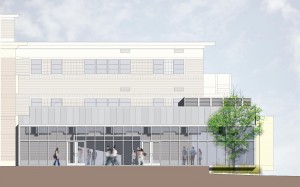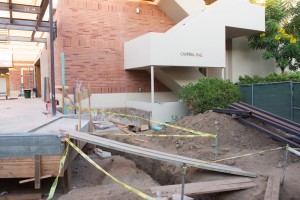Miles Goodloe walked through Campbell Hall nearly every day for four years, slipping in and out of tutoring sessions between classes, popping into counseling appointments and dropping by for quick mentoring sessions with advisors.
“Family, tutors, counselors, friends, a shelter to come to that will feed you from time to time,” said Goodloe, a UCLA alumnus, with a laugh. “That sounds like home to me.”
Campbell Hall has historically been the home of the Academic Advancement Program, which provides academic support for underrepresented students through tutoring, research and mentoring opportunities.
Construction is wrapping up on the first major renovation to Campbell Hall in the building’s 40-year history, a five-year-long project that cost about $3 million. The new extension, which is expected to be finished in June, will be a new learning pavilion for the AAP’s growing Peer Learning Facilitator program.

Many students said they see Campbell Hall as a symbolic center of adversity faced by underrepresented students on campus because in 1969, two student activists and members of the Black Panther Party, Alprentice “Bunchy” Carter and John Huggins, were fatally shot in the building.
Hazel Reed, who graduated last year but returned to UCLA to pursue a second degree, said the programs and community in Campbell Hall demonstrate the ability of people of color to overcome and prosper despite obstacles.
“African Americans and minority populations overcome so many different struggles to even attend UCLA and just to succeed in life,” Reed said.
Reed continues to be an active member of AAP. Being a 56-year-old black woman with health problems, Reed said the program has helped her fit into the UCLA community.
Recently, stickers were found around Campbell Hall and the Afrikan Student Union criticizing undocumented and black students. Luis Felipe Aviles, who graduated in 2011 and is currently a supervisor for the Peer Learning Facilitator program, said he thinks the stickers show that people are trying to send a message to students of color to try to push them out of the education system.
“(The stickers) are a counter resistance to what we are doing,” he said. “They are trying to say there is something wrong by having our presence here, which is not the case. We are breaking away from that.”
Goodloe, who graduated in 2011, said learning about the history of Campbell Hall was both surprising and empowering. He remembers taking the People of Color Tour, which visits campus landmarks of student activism at UCLA, and being shocked when they stopped by Campbell Hall to learn about the Black Panthers.
Charles Alexander, director of AAP, said the program was a result of the student activism of Carter and Huggins,as well as other students involved in cultural or political student groups.
“In 1969 Bunchy Carter and John Huggins were in the discussion over selecting a director over the African studies program,” Alexander said. “All of those students in the meeting were high potential students and they needed academic support. That was part of their activism that led to the … (creation) of the Academic Advancement Program.”
Though the program focuses on academic success for its students, it incorporates elements of social justice in its programs, Alexander said.
It also hosts workshops and training each quarter to educate students and faculty about how to navigate the university and break free of barriers underrepresented students may face, he said.
“AAP has become an agent for academic development, growth and perseverance,” Aviles said. “We don’t follow the traditional method of (teaching). It’s more of a discussion and growth together, forming a community (through learning).”
Goodloe said he thinks the programs housed in Campbell Hall helped him through his academics at UCLA and find his current career.

“Being a mentor in the Vice Provost Initiative for Pre-College Scholars Program was my largest contribution (to UCLA),” he said. “This is what I was known for.”
Working with the director of the VIP Scholars Program, Jonli Tunstall, inspired him to pursue education as a career. Goodloe said she guided him and encouraged him to not be a recipient of education, but instead, to produce it.
Goodloe said his mentors in Campbell Hall led him to realize the importance of education in his life.
“Education is activism because when you’re making someone more aware, you are giving them multiple perspectives,” he said. “When people know more things, they are more active and assertive in their desires. The creation of knowledge is the most powerful thing on the planet.”

If they’re referring to the these stickers (http://165.227.25.233/2015/05/05/stickers-targeting-undocumented-individuals-found-on-campus/), then that quote used in the article is utterly off-point and irresponsible reporting. Looks like the reporter had an agenda and used the incident and quote to push a statement that wasn’t made by the stickers (which commented on illegal immigration). It had nothing to do with pushing people of color out of the education system or saying it is wrong to have diverse students at UC. Shame on the DB editors for allowing misleading quotes in the story which detracts from the message of this story about an inclusive space on campus.